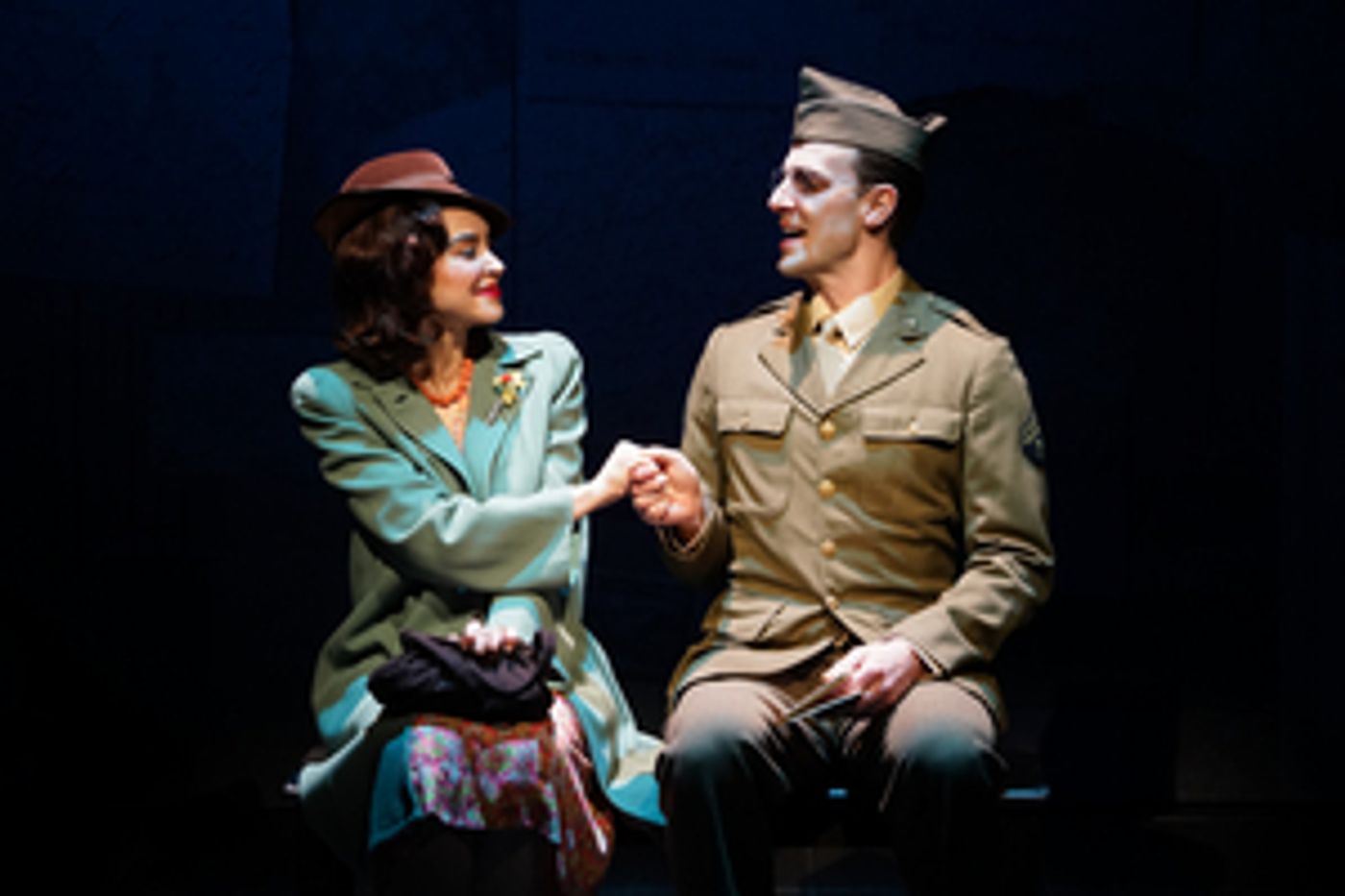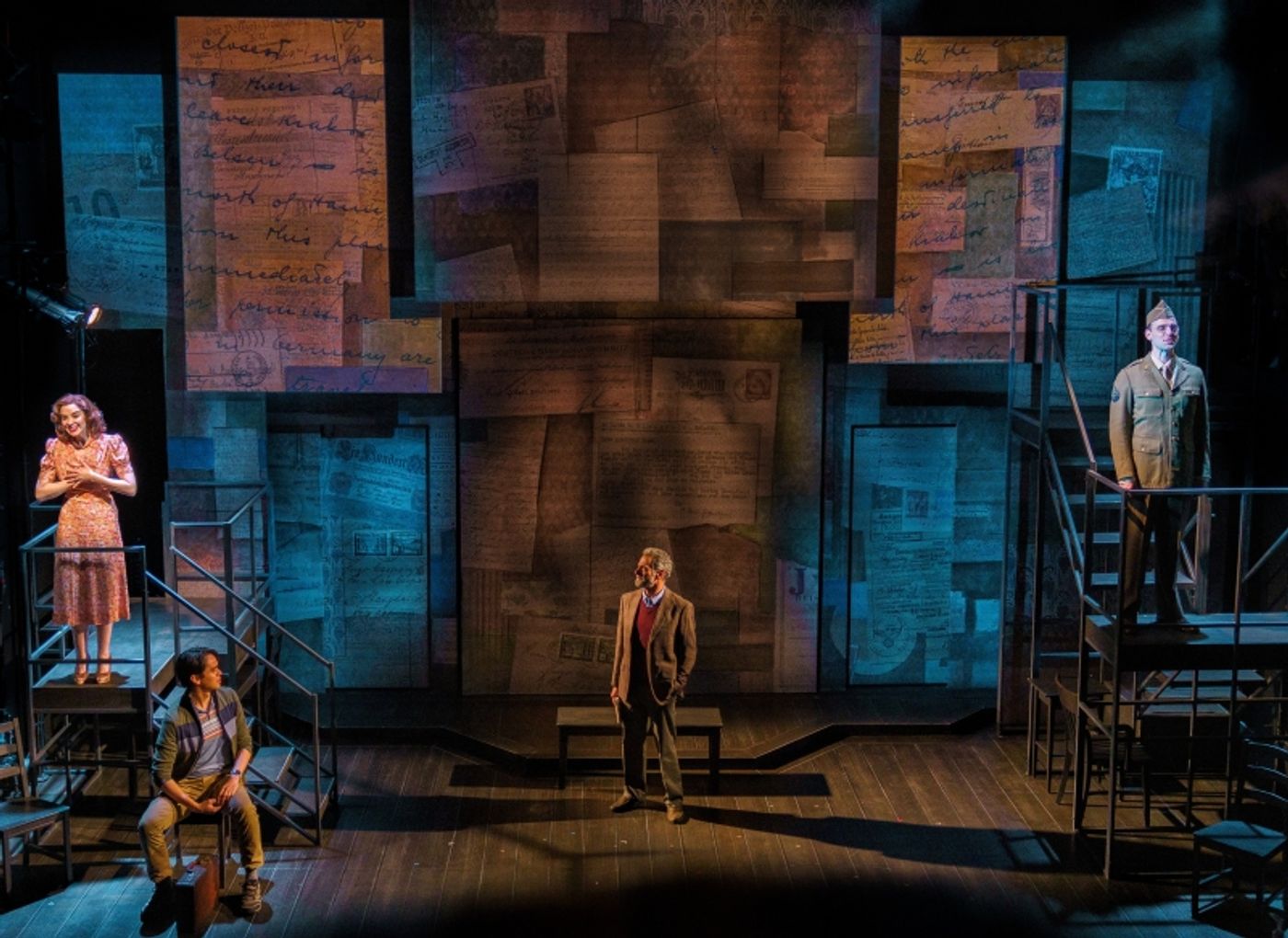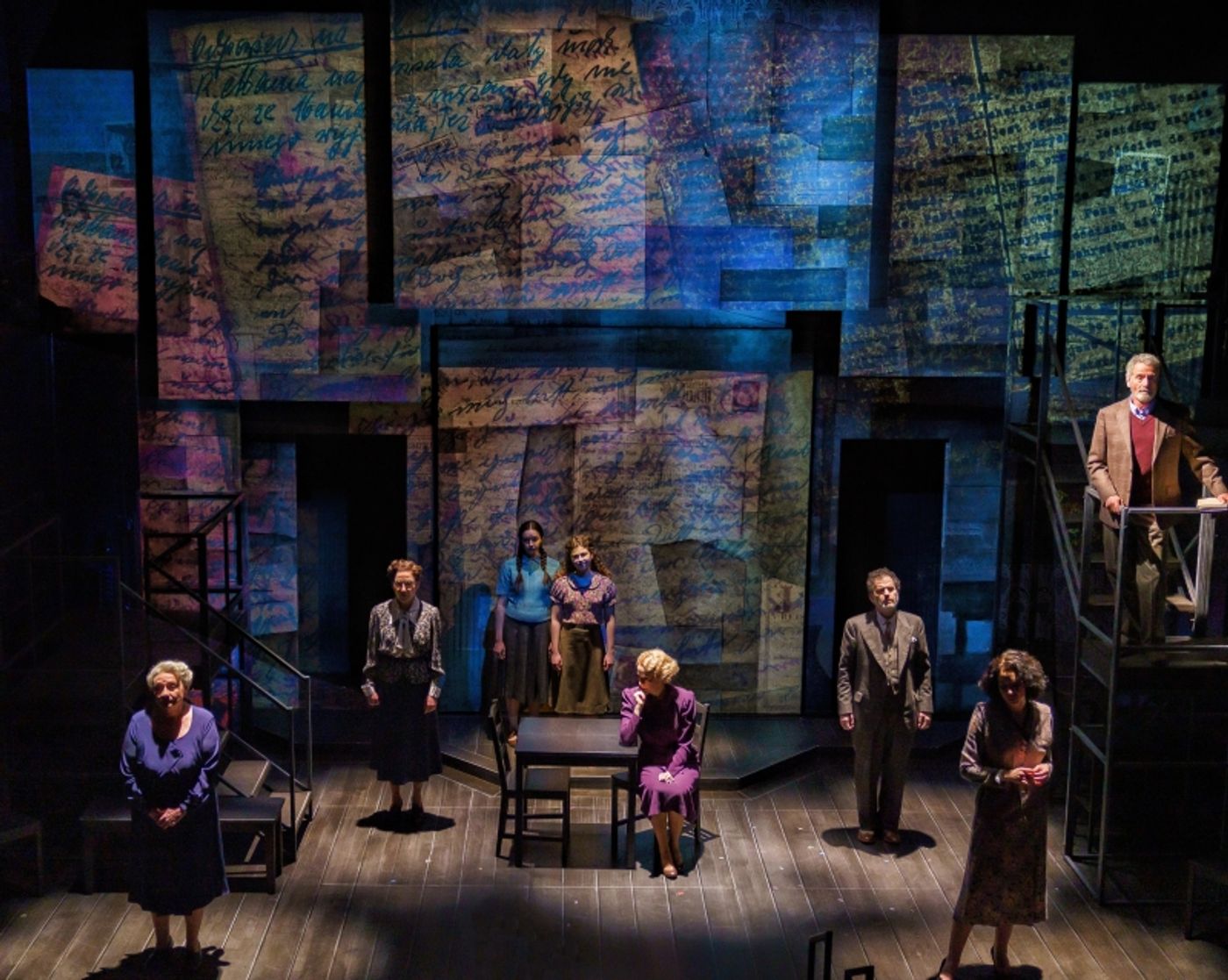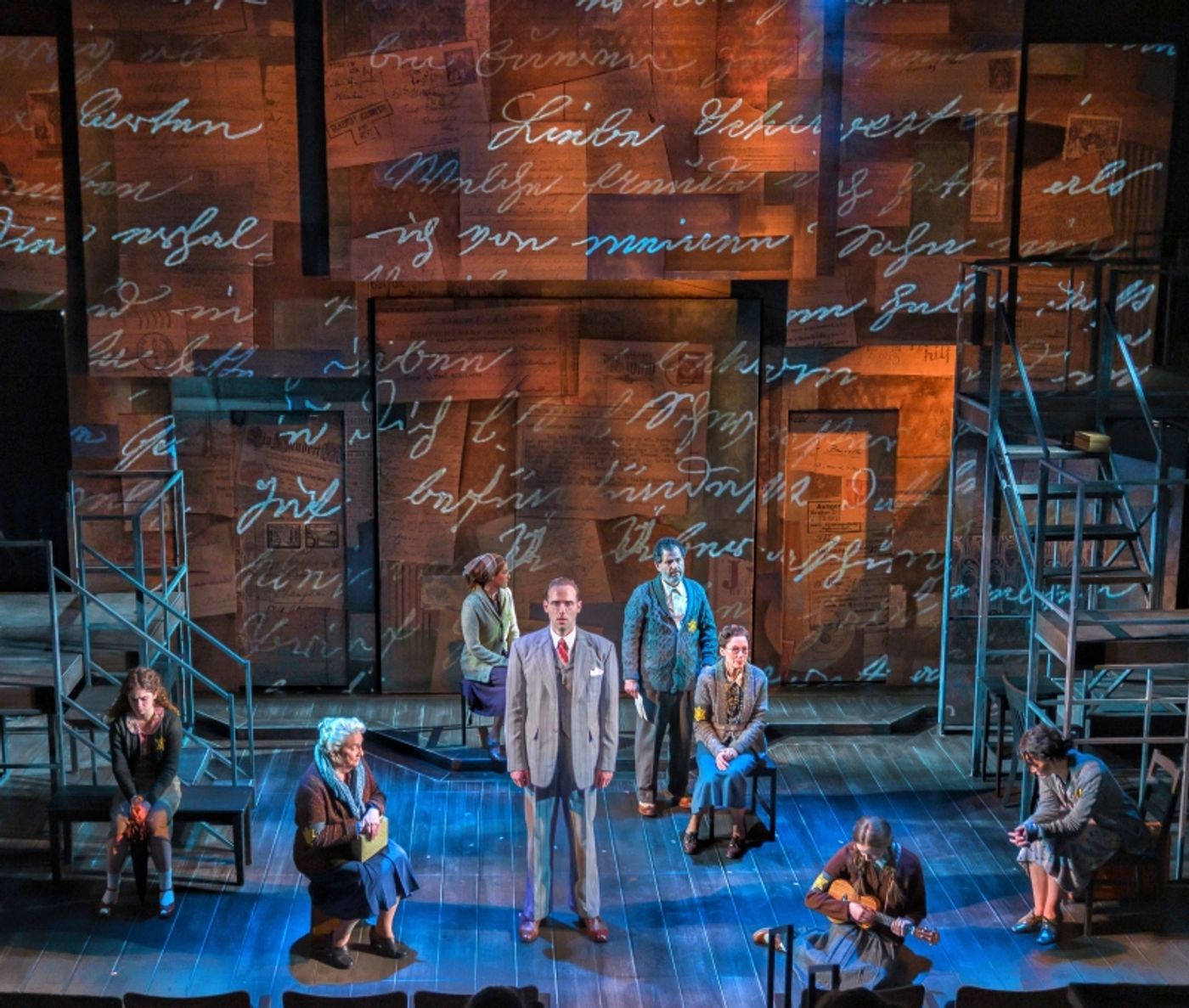Interview: Alexandra Silber Discusses Feeling Called to Play Dola/Vita in THE LUCKY STAR, VOLT Festival & Much More
Silber shares how she feels about celebrating the work of Karen Hartman, why she believes The Lucky Star is resonating with audiences, and more.

Alexandra Silber is often known for her nuanced and powerful portrayals of strong Jewish women, including Tzeitel in Fiddler on the Roof, Halina in Indecent and more. She is also the author of the novel After Anatevka, inspired by Fiddler on the Roof, which follows the lives of the characters from the musical after the curtain comes down. Silber is back on stage now in the dual roles of Dola/Vita in Karen Hartman's The Lucky Star, being presented as part of the inaugural VOLT Festival at 59E59.
Based on Richard Hollander's book Every Day Lasts a Year: A Jewish Family's Correspondence from Poland, The Lucky Star, directed by Noah Himmelstein, is set to run through June 12, 2022.
The cast of The Lucky Star also features Skye Alyssa Friedman (Kimberly Akimbo) as Genka, Danny Gavigan (Who's Afraid of Virginia Woolf?) as Joseph, Nina Hellman (Greater Clements) as Mania, Eva Kaminsky (Harry Potter and the Cursed Child) as Klara/Felicia, Alexa Shae Niziak (Matilda) as Luisa, Mike Shapiro (Motel Cherry) as Salo/Blaustein, Steven Skybell (Fiddler on the Roof in Yiddish) as Richard, Sky Smith ("The Blacklist") as Craig, and Dale Soules ("Orange is the New Black") as Berta/Arnold. The understudies are Eliza Foss, Rachel Alana Handler and Noah Zachary.
Like so many great mysteries, it all began in an attic with a dusty old suitcase... The discovery of a stash of over two hundred letters in three languages opens clues to an untold history in The Lucky Star-a gripping true story of resilience and determination, a family torn apart by war, fighting to emigrate, escape and survive. With scenes alternating between past and present, this mesmerizing, uplifting, and at times irreverent drama brings Richard Hollander's book, Every Day Lasts a Year: A Jewish Family's Correspondence from Poland to the stage, restoring a family's uncharted legacy.
BroadwayWorld spoke with Alexandra Silber about feeling called to play the characters of Dola and Vita, celebrating the work of Karen Hartman, why she believes The Lucky Star is resonating with audiences, and more.
Can you tell me about who you play in The Lucky Star?
I double as two characters, and it's pretty rangy! I play Dola Blaustein who, in the family, is the youngest of our protagonist's sisters. There is a family of four, three sisters and a baby brother. And the youngest sister, Dola, she is the black sheep of the family, and a bit of an outcast, and has a really major disintegration throughout the first act. And I'm just absolutely in love with her. She also happens to be on the cover of the book, 'Every Day Lasts a Year' that this play is based on. Her beautiful, joy-filled, haunting face, she's the cover girl on the book. I remember thinking, not knowing that that was Dola when I first saw the book cover, I was like, "What a beautiful, vibrant, Jewish woman, she's everything I ever want to be."
In the second act, our protagonist Joseph, the baby brother, he escapes Poland, makes it to America, and meets a young American Jewish girl from New Jersey, named Vita, who is an art student. They have a beautiful meeting on a train, and they are the parents of our storyteller, Richard Hollander. So, I not only play Joseph's baby sister, I also play his wife! And it's a real difference. It's really been fascinating to do it because these women are very close to each other in age, and are living in the exact same time period, but are having such different experiences of being alive.
America, and meets a young American Jewish girl from New Jersey, named Vita, who is an art student. They have a beautiful meeting on a train, and they are the parents of our storyteller, Richard Hollander. So, I not only play Joseph's baby sister, I also play his wife! And it's a real difference. It's really been fascinating to do it because these women are very close to each other in age, and are living in the exact same time period, but are having such different experiences of being alive.
I sometimes think, "What 38-year-old woman is currently in the Ukraine? And what is different about our days, and how is it different on our bodies, and in our voices, and our dreams? How does that affect who we are?" So, one of the things that is really transformative about the second act is Dola has this huge disintegration, and then I have six minutes to not only change wig, and costume, and makeup, but almost regenerate the health and vibrance, and buoyancy, and hope in my body to play Vita.
What a beautiful challenge to jump into as an actor and as a human.
Yeah, it's been so brilliant. And on a last but not least level, I think the thing that is so incredible is, I do feel like the characters I've played, like Tzeitel, and like Halina in Indecent etc., they're cumulative representations of people that existed, and my ancestors surged through me as I served those fictional representations. But it's very different to play and honor actual real people who can no longer speak for themselves. The stories cannot be told without my life and breath speaking their words. And not only Dola, who had this incredibly tragic end, but Vita, who had this fairytale life until her death. They both need me to live.
Like you mentioned, this play is based on Richard Hollander's book Every Day Lasts a Year: A Jewish Family's Correspondence from Poland. And you have had a beautiful legacy with Jewish stories and Jewish characters. What were your first thoughts when this project came your way? What was it about The Lucky Star that made you want to be a part of it?
 This is a project that I knew about and had heard about, and I went after it. One, I love the work of Karen Hartman. I had, in Washington DC a few years ago, seen her play Roz and Ray at Theater J, and fell unbelievably in love with her writing. But more than just the writing, the lens that she looks at a situation through, which I think is a huge part of storytelling. I'd known Noah Himmelstein since 2014 when we worked together on Andrew Lippa's I Am Harvey Milk at Walt Disney Concert Hall in Los Angeles, and we remained very good friends. So, when I heard that this play was coming to New York, I read it quickly and saw the Dola/Vita track, and ostensibly pitched myself to them [laughs]. And I was so grateful to them, and to our cast, and director, and to Stephanie Klapper [casting], who really knows my work, and knows me really well, and they were able to just sort of welcome me into the project. And what an honor. But it really called to me.
This is a project that I knew about and had heard about, and I went after it. One, I love the work of Karen Hartman. I had, in Washington DC a few years ago, seen her play Roz and Ray at Theater J, and fell unbelievably in love with her writing. But more than just the writing, the lens that she looks at a situation through, which I think is a huge part of storytelling. I'd known Noah Himmelstein since 2014 when we worked together on Andrew Lippa's I Am Harvey Milk at Walt Disney Concert Hall in Los Angeles, and we remained very good friends. So, when I heard that this play was coming to New York, I read it quickly and saw the Dola/Vita track, and ostensibly pitched myself to them [laughs]. And I was so grateful to them, and to our cast, and director, and to Stephanie Klapper [casting], who really knows my work, and knows me really well, and they were able to just sort of welcome me into the project. And what an honor. But it really called to me.
This might sound a little mystical, and forgive me if it does, but, as a writer, because I also write books, there have been certain characters that I've written where I'm like, "I made that up." But there were others characters, especially in After Anatevka, the one that comes to mind is this one original character named Dmitri Petrov, who I truly felt like he knocked on my door, fully formed as a person, came into my apartment and was like, "Do you have a pencil? Because I'm about to tell you my story." He called upon me to be his voice, this fictional character. And I don't know how else to describe it, but I do feel like Dola and Vita selected me to be their voice, and how can I deny them that honor? That's what it felt like.
VOLT Festival is a new festival, and it's featuring three New York premieres by Karen Hartman. How does it feel to be a part of the inaugural VOLT Festival, and to celebrate her works?
Oh my gosh, I love this question so much. Like, how did we not come up with this idea sooner, it's the best idea I've ever heard of! I think the thing that is so exciting and rare about this is we have this theater space in New York City that has these three different size theaters, all beautifully equipped to tell different levels of intimacy stories. And we have this opportunity for these plays to be in dialogue with each other at all times. And one of the things that is so exciting about a festival is now Karen Hartman's plays will be in conversation with each other. You can see all three of them and see how they stem from the same river source. And additionally, how versatile Karen's voice is, how human her lens is on any situation, both historical and contemporary. As a Jewish woman, it feels incredible to have one of our own lifted up and celebrated so publicly. I hate that it even feels cliché to say now, but representation matters. And I think one of things that is so exhilarating about that is the humanization that she brings to all of these stories.
And The Lucky Star had two sold-out runs previously at other theaters, and this is the third run. What do you think it is about this play that is clearly resonating with audiences so much?
I think something that we have that also, especially, and I put this in quotes, "post-pandemic" because what does that even mean? But I think post-pandemic, what we're feeling even more so is this is a play, yes, it's a Holocaust story, yes, but it's actually about facing and healing generational trauma. And this question of who do our ancestors belong to? And who gets to speak for them and tell their stories? And what would we all say if we got a second chance after it absolutely was too late? I think that's what it is. It's this incredibly human acknowledgement of we all have lived through something, and it would be so much easier to shelve it away and never face it, but we find we cannot live that way. And the beautiful thing about this play is its sense of redemption, and it's sense of catharsis that I think people respond to in a very primal way.
I'll say too, I talk about this often in the press and media, I wrote a whole book about it, my father died when I was really young, when I was 18. One of the many things that happens in our play, with no spoilers, is our protagonist Richard Hollander, played by Steven Skybell, talks a lot about his father, Joseph Hollander, but never talks to him. As someone who has lost their father, I think I've had more conversations with my dad in death than I ever had with him in life. And I think one of the things that's very interesting about this play is this question of, will Richard ever break the storytelling and storyteller role and "look his father in the eye and speak to, and with, him?" Because that's what's missing. That's the tension of the play. And as somebody who feels that I have achieved that in my grieving process, and know the comfort that it brings me however bittersweet, I wish that for everyone who has experienced loss.
father died when I was really young, when I was 18. One of the many things that happens in our play, with no spoilers, is our protagonist Richard Hollander, played by Steven Skybell, talks a lot about his father, Joseph Hollander, but never talks to him. As someone who has lost their father, I think I've had more conversations with my dad in death than I ever had with him in life. And I think one of the things that's very interesting about this play is this question of, will Richard ever break the storytelling and storyteller role and "look his father in the eye and speak to, and with, him?" Because that's what's missing. That's the tension of the play. And as somebody who feels that I have achieved that in my grieving process, and know the comfort that it brings me however bittersweet, I wish that for everyone who has experienced loss.
What would you say that you've learned about yourself from this play, and from playing these roles?
At risk of oversharing, I had a pretty serious battle with ulcerative colitis the last seven years, and then during the pandemic had three really intense, major surgeries removing my large intestine, and creating this J-pouch, and sewing me all back together, and it was life-saving. And I'm cured now, which is sort of an unbelievable miracle. But I'll say, I think my own brush with illness and frankly, with mortality, with the severity of all these surgeries, first and foremost, I can't deny that I have been changed by that. How can I not be? One of the things that is so interesting is, in a very literal way there is less of me. There is less of me, but I am more myself than ever. And I am fuller, and I am richer, and I am deeper. There is literally less of me, but that space has been filled with wisdom.
And what I'll say about Dola/Vita is, when I did Indecent, I went back to Indecent, and that was its own bizarre experience, because not only was I returning to it post-pandemic, but when I rehearsed and first played the role, even if it was for two performances, I still had a colon, and I still had this disease, and I was really sick. And not only was I able to return to the play post-Covid, but I was putting on a costume on a completely new body. That was bizarre. And everyone in that company knew me, and knew what I had been through, and knew Al before and after. What's interesting about this company is no one really knows, or knew, sick Al. And I think that's really fascinating, the tabula rasa of that.
Dola and Vita have given me the opportunity to learn, and show in my work, that these experiences that I have endured show up in the artist that I currently am because of all those experiences. And Dola and Vita are benefiting from that gained wisdom. I feel a level of dropping in and trusting, and I think the word I'll use is, surrender. No need to push or force. I learned such an unbelievable amount about surrender from both Covid and from this surgical process. Sometimes we cannot control or craft or "positive vibes only" away an inevitable outcome. We arrive organically at something really hard, but it's still the right decision. And I feel like that wisdom now sings in both of my characters, and it's something that I wouldn't be able to utilize to serve them until now.
Powered by
|
Videos

